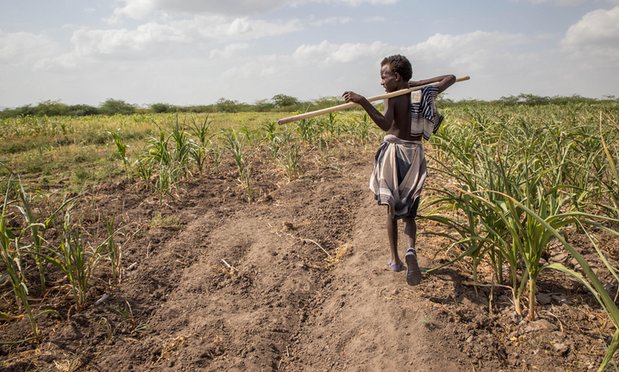PBS: Escaping Eritrea … [Read More...] about ካብ ውሽጢ ቤት ማእሰርታት ኤርትራ
‘We’re waiting to die’: Ethiopians pray even as drought response praised
Limited food and dwindling livestock has become a way of life for many Ethiopians since drought struck. The government says its countermeasures are working, yet its confidence is belied by the hardship facing farmers
Madina Boru cradles her 18-month-old son as the health worker wraps the measuring tape around his skinny upper arm. The boy is one of more than 400,000 children in Ethiopia at risk of extreme hunger as the country grapples with the worst drought in decades, caused by a particularly severe occurrence of the weather phenomenon El Niño.
“All of our crops failed last year, after the rains didn’t come,” Boru says. “My son fell sick soon after.”

Health posts such as this one in the village of Ogolcho, about 160km south of the capital, Addis Ababa, are at the forefront of a government-led humanitarian response to 10.2 million people affected by the drought. Hand-drawn charts line the walls, displaying statistics on screening and therapeutic feeding programmes for children under five. Well-trained health workers distribute medicine and peanut butter paste, a nutritional supplement for malnourished children.
In contrast with other humanitarian crises, such as the one in neighbouring South Sudan, where aid is delivered through international organisations, the government is the main channel for relief efforts in Ethiopia. It distributes food, digs irrigation canals, trucks water to dry areas, and has unleashed an army of 38,000 health extension workers who detect and treat malnutrition.
“This is a genuinely collaborative effort,” said Paul Handley, head of the UN’s Office for the Coordination of Humanitarian Affairs (Ocha) for Ethiopia. “If you like, it’s a humanitarian response through a developmental model.”
The government has committed more than £270m towards relief efforts and has pledged to dig deeper into state funds should international donors fail to meet the £1bn required. Only half has been secured so far.
“If the humanitarian partners fail to do their part, it will be the responsibility of the government to inject more money by shifting the development budget,” says Mitiku Kassa, commissioner at the government’s National Disaster Risk Management Commission.
But despite praise by international organisations and the government’s assurances that relief efforts are on track, signs of the operation’s limitations are visible on the ground. In Ogolcho, Boru complains that the aid distributed by the government doesn’t feed her whole family. “We are a family of 10, but only half of us received food rations,” she says. “I can’t say what we are getting is enough. If it was enough, I would have enough milk for my son, and you wouldn’t see him like this.”
While the funding gap is largely to blame for insufficient food aid, farmers also accuse the government of unfair distribution and corruption. “The local officials and those who lead the one-to-five groups, they use most of the aid that comes for themselves and give little to others,” says Ajo Mihesa, a farmer, referring to the government scheme to organise society at grassroots level – which human rights groups claim is aimed at controlling dissent. Mihesa’s family of nine received food rations for only two.
The drought is a setback for Ethiopia, which is proud of double-digit economic growth and aspires to middle-income status by 2025. After decades of work to shed a reputation as a poster child of poverty, the crisis has revived painful memories of the 1984 famine.
“Because of the government’s response, there is no single livestock or human who died as a result of the drought,” says Boru Jilo, deputy administrator for Fantalle district in Oromia region.
But Khamisa, a farmer who lives in the same district and preferred not to give her second name, paints a different picture. “This drought has severely affected us. Our cattle are dying. I lost four cows,” she says, pointing to dead livestock scattered around her house.
As the drought extends into its second year, aid workers worry that unless more money is raised in the next few weeks, malnutrition and child mortality rates are likely to rise. Yet the political sensitivity surrounding the drought could limit or delay full information on the crisis. Most data, including on child mortality, is collected by the government, which has already established that it “doesn’t expect any loss of life” due to the drought, according to Kassa.
Reporting on the crisis has also been controlled, with journalists requiring government approval to visit drought-affected areas. After the government criticised the BBC for its “sensational” coverage (pdf) in November, some aid organisations have shied away from taking journalists to the field. Officials at two organisations that declined to facilitate a visit for this report cited fear of ramifications and the difficulty of securing visas.
The government’s response to the drought has so far averted an escalation of the crisis. But as the donor appeal for Ethiopia, the third largest in the world, competes with disasters in Syria, Yemen and South Sudan, releasing timely and accurate information would better attract donors’ attention, experts say.
For now, the population is being left to cope with limited rations, forcing many to sell cattle to buy food. But as their livestock dwindles away, many dread what could come next. “We finished everything we had, and all of our cows are just dying,” says Mihesa. “Unless there is a miracle, we are simply waiting to die.”
